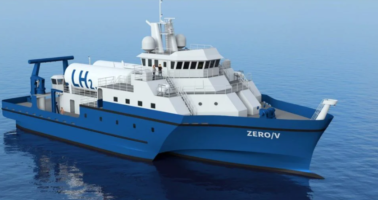Source: The energy newspaper.
In the shipping industry, the decision of the International Maritime Organization (IMO) to limit fuel sulfur emissions to 0.5% by 2020 will influence the business of all companies. This regulation will affect container ships that will have to change engines or put sulfur cleaning systems in their exhausts if they have to comply with the new directives.
But what other options are there on the market? Today electric motors are already available, but most boats require a very high maximum speed that has not yet been reached; as well as a large electrical installation that entails high costs for high powers, as explained by Indalecio Seijo Jordán, Captain of the Spanish Navy, during the last Encounter with the Sea organized by the Spanish Maritime Cluster on propulsion systems hybrids.
“Looking for a smaller CO2 footprint and a cheaper version, mixing hydrogen and oxygen to create electricity, may be an option. In the next 20 or 25 years the advances that are promised can be spectacular ”.
Indalecio Seijo Jordán, Captain of the Spanish Navy
The 96% on merchant ships in service are powered by mechanical systems in which a petroleum-derived fuel powers one or more engines (generally 2- or 4-stroke diesel). Most of the remaining 4% are diesel-electric propulsion, in which the power generated by the main engine is converted into electricity to give the ship great maneuverability.
However, other energy alternatives are being developed that could power the ships of the future, and one of them is hydrogen - a promising fuel source that has been around for quite some time but has never found a solid foundation to lean on. as technology and pricing were not convincing to incumbents.
In recent times, hydrogen fuel cells are the best option for truck fleets and in confined spaces such as ports, airports and warehouses where hydrogen forklifts help reduce emissions. The long-term cost of hydrogen-powered equipment is in line with diesel-powered equipment, making it an attractive alternative. Furthermore, hydrogen produced on a large scale by electrolysis from renewable sources is today on par with diesel for the automotive, bus and truck industries.
However, in the maritime industry, fossil fuel is much cheaper and more practical compared to hydrogen fuel cells, making it difficult to promote the latter to the shipping industry in general. This fuel is also easy to acquire and store, it is easy to pump in atmospheric conditions because it is a liquid and it is also less expensive. However, with IMO regulation and the increasing initiation of local environmental regulations, the hydrogen fuel industry knows that it must be prepared for further penetration.
The pilot trials are in Europe. Norway has been one of the pioneers, as government policies and industry involvement have helped drive the introduction of zero-emission ships that run on hydrogen fuel cells. But the Scandinavian country's first fully hydrogen high-speed route is not expected until 2020. The second is for container ships on short-haul routes between Scandinavia and Western Europe to run partly on hydrogen fuel.
“Having demonstrated the technical feasibility of fuel cells in shipbuilding, the use of hydrogen seems to be geared towards its use and the production of synthetic fuels. The studies carried out so far determine that proton and high temperature ones are the most suitable for the marine industry "
Jorge Dahl, Business Development Manager at DNV GL

